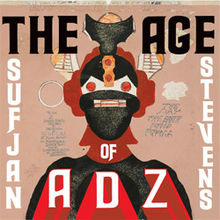album and live music review: sufjan stevens, the age of adz
Sufjan Stevens is a name synchronous with the music of our generation. He is a bona fide indie superstar, artistic genius, and methodical talent. He’s been around a long time and a lot of people love him but strangely, most diehard fans I know didn’t enjoy his latest album, The Age of Adz.
I’ll give you a brief summary: the album explores digitization’s effects on Sufjan’s standard orchestral, sweeping, technical compositions. Sufjan Stevens is famous in part for layering sound so methodically, uniquely, and above all, intelligently that when the explosion of a chorus or bridge comes, the release is pure joy. Listen to “Come On! Feel the Illinoise!” or “Chicago” off his career-defining Come On Feel The Illinoise! if you need proof. The other, older part of Sufjan’s reputation revolves around his angelic voice and touching, haunting, mellower songs like “Flint” off Greetings From Michigan: The Great Lakes State or “Seven Swans” from Seven Swans. Hence, fans have come to expect certain things from him as an artist, so when he released the borderline psychedelic The Age of Adz last month, many were outraged.
At the very surface, The Age of Adz is somewhere between MGMT and David Bowie. I must admit that when I first streamed the album before its release thanks to NPR’s First Listen, I couldn’t believe Sufjan was serious. It seemed to me that he was making a mockery of everything his fans loved him for, that somehow the heavy use of the drum machine and reverb effects meant that he had lost his touch. However, the more I listened to it, the more I realised that he had simply made an artistic transgression with The Age of Adz: he took his composition and music theory knowledge and applied it to electronic music. Once I understood that, it was hard not to appreciate The Age of Adz for what it is: a fun album, yes, but with the unmistakable craftsmanship and intellectual merit that makes it Sufjan Stevens. My favorite tracks from the album are “Too Much” and “Age of Adz” because his progression is really demonstrated well on these songs. There are hooks repeated in eerie unison, female background singers, clear vocals from Sufjan, slow progressions and epic releases all on top of electronic soundscapes instead of the banjo and trumpet. The rest of the album takes the listener through a sonic journey where Sufjan starts slow (beginning track “Futile Devices”) and builds and maintains both the pace and the quality of the sound until the last track, the 25-minute stunner “Impossible Boy”. “Impossible Boy” is a meta representation of the whole album, as it progresses in such unexpected beauty that it’s hard to remember you’re still listening to the same song.
Sufjan’s artistic transgression REALLY became apparent when I saw him perform on November 15, 2010, at NYC’s Beacon Theatre. The tickets were downright impossible to get (thank God my roommate patrolled the Ticketmaster site 15 minutes after two back-to-back dates went on sale), and although I literally had the last seat in the house, his artistic genius and the performance blew my mind.
In the two-plus hours he played, we heard the entire The Age of Adz album, including “Impossible Soul” that culminated in a huge dance party (watch the second half of the song), as well as very selected few songs off the older albums. Maybe it’s because I was in the very last row, but it was visible to me that a lot of fans were disappointed to hear more new songs than old. I sympathised with this at first, but progressively started to disagree with the crowd sentiment as the show proceeded because we were witnessing something really awesome. As Sufjan explained throughout performance, this album is about the HERE and NOW. The album’s focus on the present is perfectly reflected in the change of his sound.
The show itself was somewhat of a spectacle, complete with beach balloons, background dancers, two drum sets, a horn section, and auto-tune, but somehow, it worked. I thought it was odd that we had to stay seated throughout the show, although I enjoyed being able to really take in the entire performance. One of my friends saw him the day before I did and said it was “the weirdest show I’ve ever been to, but amazing.” I can’t totally agree, but the final Age of Adz show achieved something special: that high of experiencing something epic that all concertgoers chase, in a most strange brand of pop musical theater from the future.



Pingback: live music review: sufjan stevens, prospect park, 2 august 2011